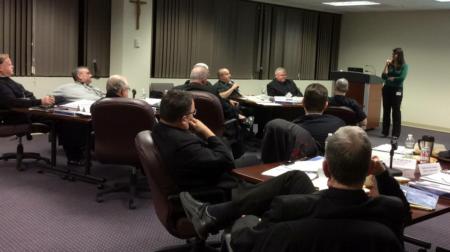Phase III pastor training
Phase III collaboratives will be inaugurated in June. Preparation is underway. Earlier this week 17 priests who will pastor 36 parishes in Phase III collaboratives came to the Pastoral Center to begin their training.
Pastor training has a different look this time around. Even before its implementation, the archdiocesan pastoral plan was explicit, "The Office of Pastoral Planning will assist the Archbishop in evaluating the effectiveness of the archdiocesan pastoral plan, in recommending adjustments when necessary, and in assisting the collaboratives to learn from the experiences of other collaboratives in the Archdiocese." (Disciples in Mission Part One 10.g). Based on the feedback from Phases I and II, the training format and time frame for Phase III pastors was adjusted. A new start and end time allowed pastors to celebrate a morning funeral Mass and avoid rush hour traffic. Instead of coming one week in March and one week in May, pastors came for two days this week, will be back for two days next week and again in May. Also in May, they will also have training with their newly assigned parochial vicars and in June with those newly ordained who will be assigned to their collaborative.
Training began with a welcome from vicar general Bishop Peter Uglietto who thanked the priests for coming and for their generosity in saying yes. He reminded them that Cardinal O'Malley's number one priority is evangelization and, "the Pastoral Center staff is here to assist, support and pray for you." Bishop Uglietto's presence and words of encouragement underscore the importance of implementing the pastoral plan and the support that both he and Cardinal O'Malley continually provide.
The Office of Lifelong Faith Formation and Parish Support (OLFFPS) took the lead these two days. Pastors and soon-to-be pastors bring a wealth of experience to the task. Ranging from 42 to 12 years ordained, the group has a combined total of 468 years of priestly service. The exchange of ideas and best practices among the priests was extremely valuable. Pastoring a collaborative is new, but there are valuable skills that are transferable to this new context.
The program began with an honest discussion about the need for training and the time commitment. The openness of participants and obvious presence of the Holy Spirit showed in the frank, respectful, comments: "Lent is a very busy time to be away from the parish"; "taking on the responsibility of shepherding multiple parishes is big, but I'm excited to be here"; "I'm in a wait and see mode. I'll see what happens and then decide how I feel about it"; "training is helpful." Several pastors expressed appreciation for the services they have already received from Pastoral Center offices. One priest was uncomfortable with the word "training" and its didactic connotation but greatly looked forward to "learning from the men here with so much experience."
Acknowledging the experience in the room, Patrick Krisak, director of Parish Training and Support, started by asking the priests to share some of their successes and best practices that are signs of an evangelizing parish. The floodgates opened! From bereavement to baptism ministry to book clubs, hospitality and family faith formation, priest after priest told what was working well in their current parishes.
The long history of planning was mentioned, prompting discussion of our current reality of four core deficits: clergy, certified lay ministers, money, and dwindling numbers of Catholics at weekly Mass. We are beginning Phase III, but there are still hard questions that need to be addressed.
Day one ended with a discussion of the "gateway moments." Sacrament preparation and funerals, are opportunities to reach out to people who are not at Mass each week. The group was urged to adopt "gateway eyes" when interacting with families and individuals at these times.
On Tuesday, the group assessed the previous day. Comments varied. "Refreshing"; "Scares me to think I have to implement what I learned in more than one parish"; "Yesterday opened up possibilities, it's good to know that more practical information will be part of upcoming sessions." Some of the suggestions raised on Monday were well received "great ideas" said one priest. Other ideas, in the light of day seemed unrealistic. What works in one place won't, necessarily, work in another. There was a general sense of gratitude to the OLFFPS team and the Collaborative Support Team, from the Human Resources, Parish Financial Services, Real Estate, and Pastoral Planning offices.
Much time was spent in general discussion about the road ahead. One pastor currently overseeing two parishes, commented that, "maintenance is more draining than working very hard on new things." Several raised the point that there will always be a need to adopt and adapt, one cannot go into a collaborative "with a paint by number mindset." This is not cookie cutter ministry. Over and over, the priests stressed the need to listen, and the danger of "plowing ahead."
The final activity of the day involved looking at how the seven traits of an amazing parish could be implemented in a collaborative. The priests left in good spirits and before the snow fell. They will be back next week for two more days of training. These good men are deserving of our gratitude and prayers.
SUSAN ABBOTT IS COORDINATOR OF PARISH OUTREACH FOR THE ARCHDIOCESE OF BOSTON'S OFFICE OF PASTORAL PLANNING.
- SUSAN ABBOTT IS EVANGELIZATION ASSOCIATE, OUR LADY OF GOOD VOYAGE SHRINE.



















